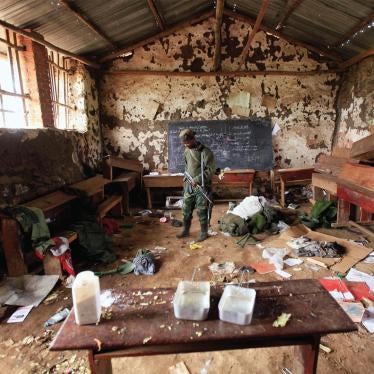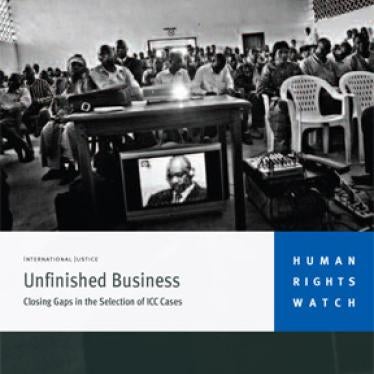Hundreds of thousands of children have fought as soldiers in recent armed conflicts, but very few have seen their commander stand trial for sending them to the front lines. Yesterday, Thomas Lubanga became the first person prosecuted before the international criminal court, and on just such charges. He is accused of committing this war crime in the Democratic Republic of the Congo, but the significance of his trial will resonate far beyond.
In 2002 and 2003, Lubanga was the head of an armed opposition group known as the Union of Congolese Patriots (UPC) in the Ituri region of eastern Congo. He claimed to have 15,000 troops under his command; local observers believed that at least 40% were children. Lubanga's soldiers routinely recruited children by force, including boys and girls as young as seven. In one incident in 2002, UPC soldiers entered a school and forcibly rounded up the entire fifth grade for military service. Children were so prevalent in the UPC that the force was known as "an army of children".
All parties to DRC's war used children as soldiers, including the government and militias supported by Uganda and Rwanda. At the height of the war, the United Nations estimated (pdf) that 30,000 children were fighting as soldiers in the DRC.
Children continue to fight there and in at least 14 other armed conflicts worldwide. Among the worst examples, Burma's national armed forces have recruited tens of thousands of children, abducting 12-year-old boys off the streets and deploying them against ethnic opposition groups. In Colombia, thousands of children fight in irregular armed groups, including the Farc and ELN guerrillas. Children who join "voluntarily" for money or prestige soon learn that the price of desertion may be execution. In Sri Lanka's long-running civil conflict, ethnic Tamil families are told that they must give at least one child for the rebels and that if they complain to authorities, they will never see the child again.
The recruitment and use of child soldiers is prohibited by several international treaties: 126 countries have ratified a treaty that sets 18 as the minimum age for any conscription or use of individuals in hostilities. But recruiters continue to prey upon children because they are easy targets, easily manipulated, and - significantly - because they rarely face any sanctions. In Burma, for example, military recruiters are rewarded for new recruits - regardless of age - with cash bonuses and bags of rice.
The prosecution of Lubanga, and other recent and pending cases, are beginning to chip away, finally, at the longstanding notion that there will be no penalty for sending children into battle. In 2007, four individuals were convicted of recruiting and using child soldiers by the special court for Sierra Leone. The international criminal court has also brought these charges against other commanders from the DRC and Uganda. Among them is Joseph Kony, the leader of the notorious Lord's Resistance Army, which has abducted more than 25,000 children as soldiers in Northern Uganda during the last 20 years, and is presently abducting and killing children in DRC.
In October 2008, the United States enacted a new law that enables it to prosecute child recruiters who set foot on US soil - even if the crime took place in another country.
Child recruiters are beginning to take notice. The special representative to the UN secretary-general on children and armed conflict, Radhika Coomaraswamy, says that when she meets with leaders of armed groups about their use of child soldiers, they often express concern about possible ICC prosecution. Some - including armed groups in Cote d'Ivoire and Burma - no longer use child soldiers. Some fear actual prosecution, while others simply don't want to be associated with a practice increasingly condemned as a war crime.
Lubanga's trial has special significance for his victims in Ituri. But its importance also reaches all around the globe. It sends a message to all commanders with children in their ranks that they cannot continue to exploit children this way without being branded war criminals and risking imprisonment. Countless children will be safer if military leaders heed this warning.






